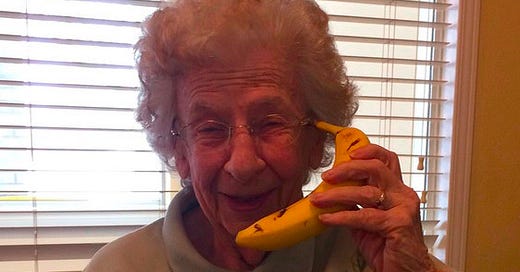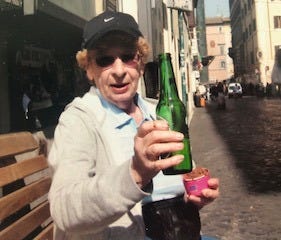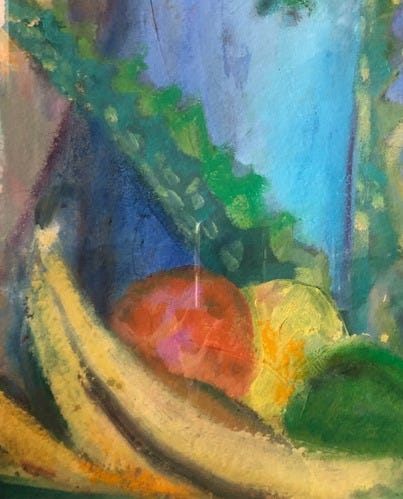I laugh out loud as I come across an old photo of my mother with a banana to her ear. There’s more than a few pictures of her up around our home, but I’d forgotten about this one. In the quiet of these winter mornings, I sense her leaning in and smiling.
We weren’t especially close. I held her at arm’s length for reasons that seem trivial now, but ones that loomed large in the wounds of my younger self. Then, after my father’s death, as she aged and dementia eventually took over, her proud independence was eclipsed by neediness. The period of intensive caregiving that followed was amongst the most difficult of my life, but also ultimately the place of my deepest healing and inspiration.
I write about this unexpected turn in our relationship in my book, The Call to the Far Shore. How her funny side kept coming out, making me see the weight of the hard years that had crushed her lightness of spirit. And how I came to find myself to be not only the dutiful daughter, but also her playmate.
I’m having to think back as to why she had that banana to her ear. Now I remember: I’m trying to talk with her about death, and the possibility that we can still talk to our loved ones after death. I lightly bring up my deceased father, saying “I wonder how Dad’s doing?” She responds, “Yes, wouldn’t it be good to ask him what it’s like?” We’re sitting at a round table in the foyer of her retirement home. I say, “Well, let’s ask him.” She immediately grabs a banana from the fruit bowl in front of us, puts it to her ear and exclaims loudly, “So how’s it going up there?” I pretend that I’m Dad answering back: “Not bad at all. Give a call anytime, it’s good to talk with you.” Yes, I could laugh a bellyful with her when both our controlling sides let up. We went on imagining what it might be like, where Dad was. It was a way I could keep the door open to the topic of death, but in a light, friendly way.
I know a lot of people who have taken on big care-taking roles with elderly parents. I get a little squeamish in my stomach when I hear their dilemmas, remembering my own. There are some things that would have helped me to know back then, like remembering that no matter how much care my Mum needed she was still the parent, and I the child.
It’s a temptation to slide into a parent role with our elderly mum or dad.
Efu Nyaki, a family constellations and somatic practitioner from Tanzania, speaks about the importance of knowing our place of belonging. In a workshop series she did with somatic experiencing pioneer, Peter Levine, she reminds us, “I can never be their parent. I am a child forever to them. When I start thinking that I’m their parent, I suffer, and it becomes very heavy.”
I think back to the frozen shoulder that incapacitated me toward the end of my Mum’s life, when I assumed so much of the burden of her care. And suffered over what she might be suffering. Thought I could save her from it. Maybe if I had asked her for some motherly advice, or, as Efu suggests, a blessing, it would have restored my place as child—not parent, not rescuer.
I’m all for caregiving. Don’t get me wrong. But our attitude matters greatly. Do we carry the responsibility with a certain amount of grace, knowing that another’s fate is not all up to us? Or do we become like Atlas, the Titan god, bearing the whole sky on our (frozen) shoulders?
I like the image Efu gave us that helps us get into the right frame of mind and embody what’s possible to change:
“You can’t fix your parents. If you have a fight with them, sit down on the floor, or imagine that you are, and look up, see them there bigger than you.”
So, my Mum and Dad are up there, I’m here, my children below me. Not better or worse, different. Just the simple, straightforward order of who came first based on age and generational lines. This is the direction, according to family constellations therapy, that love flows most freely. Like a waterfall, the love and care from generations of ancestors flows down to us.
I’m now looking at other photos of Mum and seeing her impish delight in silly things. I treasure that part of her that has come down to me.
I can’t but hear her laughing as I write this…
Photo image above: Mum hamming it up on holiday in an ally way in Rome, ice-cream in one hand, beer in the other—mine, of course.
More on these themes are found in Nancy’s book, to be published by Inner Traditions, April 8th, 2025.
Pre-orders of The Call to the Far Shore: Carrying Our Loved Ones Through Dying, Death, and Beyond are now available through your local bookstore, Amazon, and most major booksellers.
https://www.amazon.ca/Call-Far-Shore-Carrying-through/dp/B0D9TMVNL9
https://www.simonandschuster.com/books/The-Call-to-the-Far-Shore/Nancy-MacMillan/9798888501092
“Nancy’s book brings a great lesson and healing to the world. One can already feel the impact it will bring to so many people who are suffering because of disconnection from life itself, hence a fear of dying. When we realize that we are one and that we are connected deeply through the breath we take in, life is inevitable and death is the transformation of it. Nancy describes this phenomenon very beautifully in this inspiring book.” —Efu Nyaki, author of Healing Trauma through Family Constellations and Somatic Experiencing: Ancestral Wisdom From the Snail Clan of Tanzania
Art credit: Fruit Still Life by Jane Fawcett








Hi Andrea, Thanks for your comment and insight. Makes me hope I can relax into a playful old age.
Hi Ara, I appreciate you commenting.